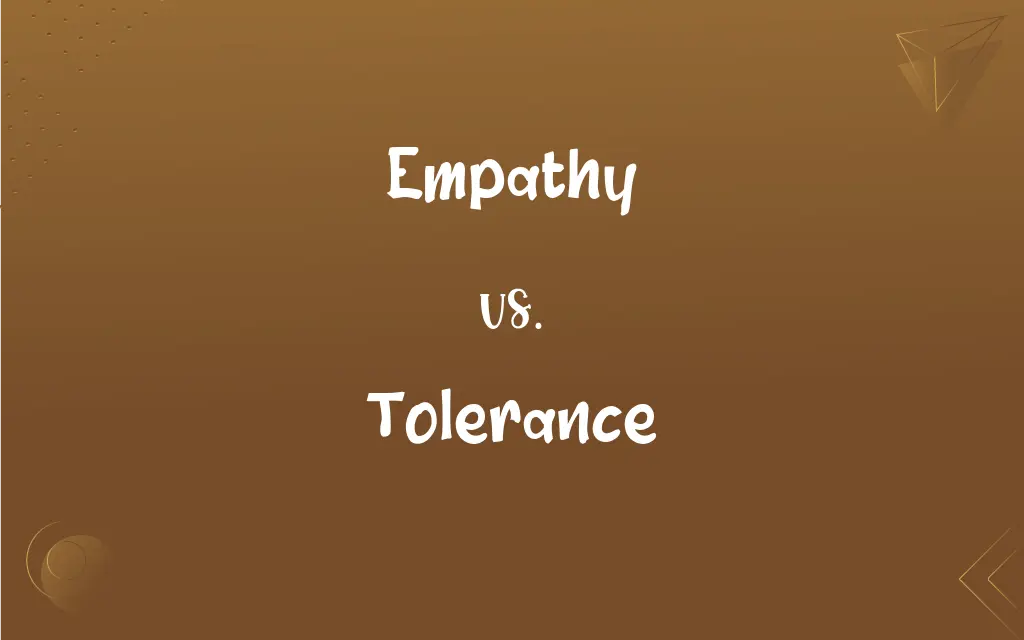Empathy vs. Tolerance: What's the Difference?
Edited by Harlon Moss || By Janet White || Updated on October 4, 2023
Empathy is understanding and sharing another's feelings, while tolerance is accepting differences without judgment. Both relate to interpersonal relations but differ in depth and nature.

Key Differences
Empathy and Tolerance, though interrelated, are distinct concepts focusing on how we relate to others. Empathy involves stepping into another's shoes, feeling their emotions, and understanding their perspective. It's about emotional connection and deep comprehension. On the other hand, tolerance is about acceptance. Tolerance doesn't necessarily require deep emotional understanding, but rather a respect for differences and a willingness to coexist without prejudice.
Empathy often leads to a deeper emotional bond, as it requires one to genuinely feel the emotions of another. It's about more than just understanding; it's about shared feeling. Tolerance, in contrast, doesn't delve into shared emotions. Instead, it's an acknowledgment of differences—whether in beliefs, behaviors, or values—and a decision to accept and respect those differences.
It's worth noting that while empathy can foster genuine compassion and can drive actions based on understanding others' feelings, tolerance is more about coexistence. Someone might tolerate a behavior they don't understand or even disagree with, but with empathy, they would seek to understand the emotions driving that behavior.
In essence, empathy dives deeper into emotional realms, fostering understanding and shared feelings. Tolerance, meanwhile, operates on a more surface level, promoting acceptance and peaceful coexistence even in the absence of deep emotional understanding.
Comparison Chart
Definition
Understanding and sharing another's feelings
Accepting differences without judgment
ADVERTISEMENT
Depth
Emotional connection and understanding
Respect for and acceptance of variance
Focus
Feelings and emotions
Differences in beliefs, behaviors, etc.
Outcome
Deep emotional bond
Peaceful coexistence
Requirement
Emotional comprehension
Respect and acceptance
Empathy and Tolerance Definitions
Empathy
Recognizing emotions in others.
His empathy made him a preferred counselor among students.
ADVERTISEMENT
Tolerance
Endurance of the presence of something without adverse reaction.
The body's tolerance to a drug can increase over time.
Empathy
Sharing another's emotional experience.
The movie's portrayal evoked empathy from the audience.
Tolerance
Recognizing and respecting differences.
Cultivating tolerance is key in a multicultural society.
Empathy
The ability to understand and share the feelings of another.
She showed great empathy when her friend was grieving.
Tolerance
The capacity to endure hardship or inconvenience.
Farmers have to have tolerance for unpredictable weather.
Empathy
Sensing and resonating with someone's emotions.
Her empathy made her sensitive to her friend's sadness.
Tolerance
A fair and objective attitude towards those whose opinions differ.
Her tolerance was evident in debates.
Empathy
The ability to identify with or understand the perspective, experiences, or motivations of another individual and to comprehend and share another individual's emotional state.
Tolerance
The capacity for or the practice of recognizing and respecting the beliefs or practices of others.
Empathy
The projection of one's own feelings or thoughts onto something else, such as an object in a work of art or a character in a novel or film.
Tolerance
Leeway for variation from a standard.
Empathy
Identification with or understanding of the thoughts, feelings, or emotional state of another person.
She had a lot of empathy for her neighbor; she knew what it was like to lose a parent too.
Tolerance
The permissible deviation from a specified value of a structural dimension, often expressed as a percent.
Empathy
Capacity to understand another person's point of view or the result of such understanding.
Tolerance
The capacity to endure hardship or pain.
Empathy
A paranormal ability to psychically read another person's emotions.
Tolerance
Physiological resistance to a toxin.
Empathy
MDMA.
Tolerance
Diminution in the physiological response to a drug that occurs after continued use, necessitating larger doses to produce a given response.
Empathy
Understanding and entering into another's feelings
Tolerance
The ability to digest or metabolize a food, drug, or other substance or compound
Glucose tolerance.
Empathy
Relating to another's emotional state.
Empathy is essential in therapeutic professions.
Tolerance
Acceptance of a tissue graft or transplant without immunological rejection.
Tolerance
Unresponsiveness to an antigen that normally produces an immunologic reaction.
Tolerance
The ability of an organism to resist or survive infection by a parasitic or pathogenic organism.
Tolerance
The ability to endure pain or hardship; endurance.
Tolerance
(uncountable) The ability or practice of tolerating; an acceptance of or patience with the beliefs, opinions or practices of others; a lack of bigotry.
Tolerance
(uncountable) The ability of the body (or other organism) to resist the action of a poison, to cope with a dangerous drug or to survive infection by an organism.
Tolerance
(countable) The variation or deviation from a standard, especially the maximum permitted variation in an engineering measurement.
Our customers can generally accept ten times the tolerance which we can achieve in our machining operations.
Tolerance
(uncountable) The ability of the body to accept a tissue graft without rejection.
Tolerance
The power or capacity of enduring; the act of enduring; endurance.
Diogenes, one frosty morning, came into the market place, shaking, to show his tolerance.
Tolerance
The endurance of the presence or actions of objectionable persons, or of the expression of offensive opinions; toleration.
Tolerance
The power possessed or acquired by some persons of bearing doses of medicine which in ordinary cases would prove injurious or fatal.
Tolerance
Capability of growth in more or less shade.
Tolerance
The allowed amount of variation from the standard or from exact conformity to the specified dimensions, weight, hardness, voltage etc., in various mechanical or electrical devices or operations; - caklled also allowance
Tolerance
The capacity to resist the deleterious action of a chemical agent normally harmful to the organism; as, the acquired tolerance of bacteria to anitbiotics.
Tolerance
The acquired inability to respond with an immune reaction to an antigen to which the organism normally responds; - called also immunotolerance, immunological tolerance, or immune tolerance. Such tolerance may be induced by exposing an animal to the antigen at a very early stage of life, prior to maturation of the immune system, or, in adults, by exposing the animal to repeated low doses of a weak protein antigen (low-zone tolerance), or to a large amount of an antigen (high-zone tolerance).
Tolerance
The power or capacity of an organism to tolerate unfavorable environmental conditions
Tolerance
A disposition to allow freedom of choice and behavior
Tolerance
The act of tolerating something
Tolerance
Willingness to recognize and respect the beliefs or practices of others
Tolerance
A permissible difference; allowing some freedom to move within limits
Tolerance
The willingness to accept opinions or behavior one may not agree with.
His tolerance for diverse views made him a great mediator.
FAQs
Is tolerance always positive?
Generally yes, but passive tolerance can sometimes avoid addressing deeper issues.
Do Empathy and Tolerance mean the same thing?
No, empathy is about understanding feelings, while tolerance is about accepting differences.
Is empathy innate or learned?
It's believed to be both; some are naturally empathetic, but it can also be cultivated.
Can a person be tolerant but not empathetic?
Yes, one can accept differences without deeply understanding feelings.
Are Empathy and Tolerance values or emotions?
Empathy is an emotion, while tolerance is a value.
Why is empathy important in relationships?
It builds emotional connections and understanding.
How do Empathy and Tolerance play roles in communication?
Empathy helps in understanding emotions, while tolerance aids in accepting differing views.
Why might someone lack tolerance?
Lack of exposure, education, or entrenched biases might reduce tolerance.
Can you have empathy without tolerance?
It's possible but rare; understanding often leads to acceptance.
Can you teach tolerance?
Yes, through exposure to diversity and education.
How do cultural differences impact Empathy and Tolerance?
Cultural understanding enhances both empathy toward individuals and tolerance of differences.
How do Empathy and Tolerance relate to conflict resolution?
Empathy understands feelings, and tolerance facilitates acceptance, both key in resolving disputes.
How do Empathy and Tolerance affect mental health?
Both can improve well-being by enhancing understanding and reducing conflict.
Can animals exhibit empathy?
Some animals display behaviors suggesting empathy.
How can one increase their level of tolerance?
Education, open-mindedness, and exposure to diverse perspectives can help.
How is tolerance tested in a society?
When diverse beliefs, values, or behaviors coexist.
Can Empathy and Tolerance coexist with disagreement?
Absolutely, understanding and acceptance don't always mean agreement.
Are Empathy and Tolerance related to morality?
Many consider them moral virtues, promoting understanding and acceptance.
Is there a downside to excessive empathy?
Overwhelming empathy can lead to emotional burnout.
Which professions require a high level of empathy?
Therapists, counselors, and healthcare professionals, among others.
About Author
Written by
Janet WhiteJanet White has been an esteemed writer and blogger for Difference Wiki. Holding a Master's degree in Science and Medical Journalism from the prestigious Boston University, she has consistently demonstrated her expertise and passion for her field. When she's not immersed in her work, Janet relishes her time exercising, delving into a good book, and cherishing moments with friends and family.
Edited by
Harlon MossHarlon is a seasoned quality moderator and accomplished content writer for Difference Wiki. An alumnus of the prestigious University of California, he earned his degree in Computer Science. Leveraging his academic background, Harlon brings a meticulous and informed perspective to his work, ensuring content accuracy and excellence.































































